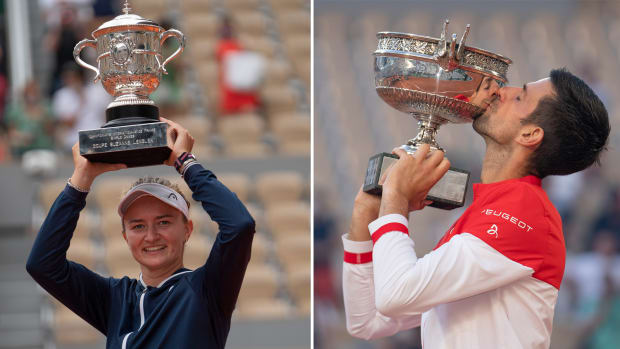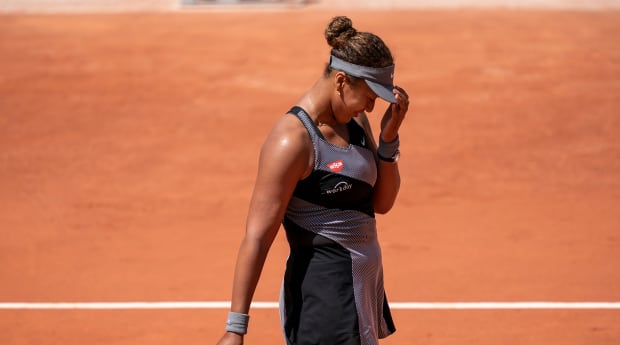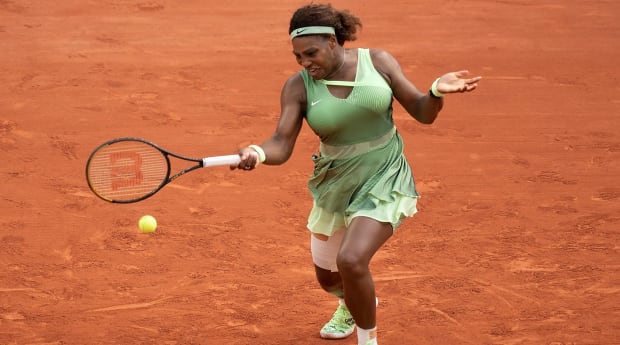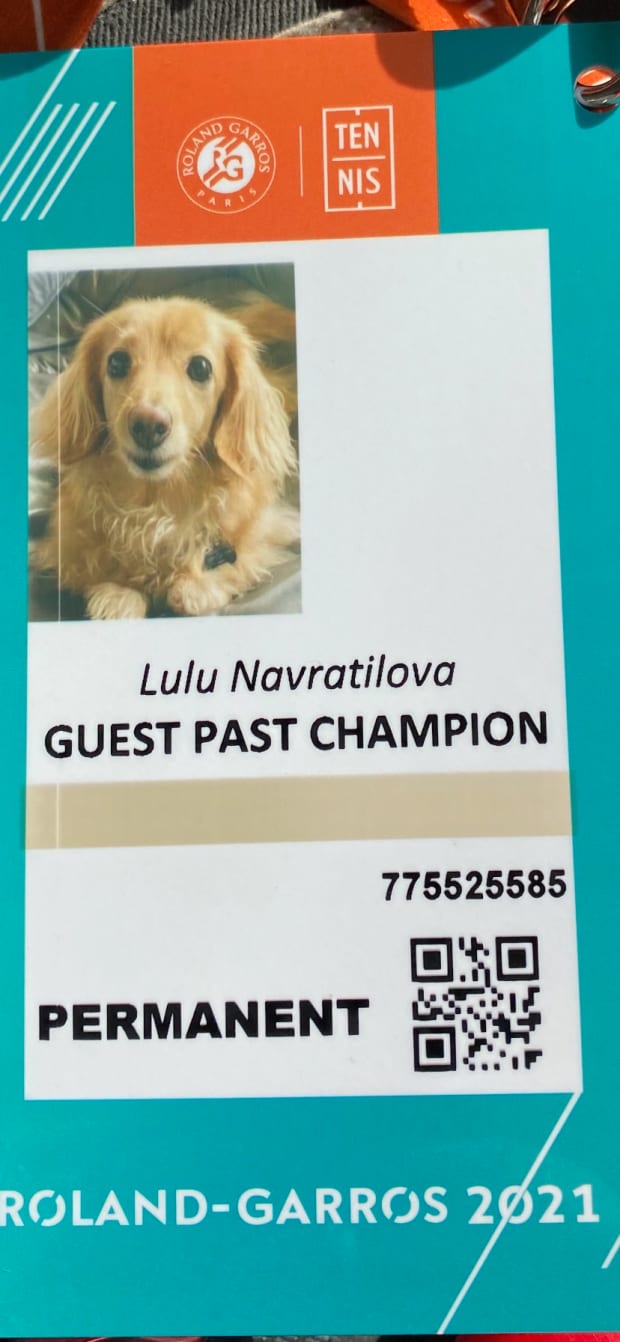Wrapping up the 2021 French Open, where Barbora Krejcikova won her first major title and Novak Djokivic won his 19th Grand Slam.
A major that started inauspiciously—with a global cause celebre—ended on a quiet, dignified note, albeit without Rafael Nadal winning and without a seeded woman taking the title. Cleaning out the notebook from the 2021 French Open with 50 assorted thoughts. First, my publisher would clobber me like Novak Djokovic would clobber a return, if I didn’t plug this, so kindly note I have a book about the Summer of 1984. “Glory Days:
The Summer of 1984 and the 90 Days That Changed Sports and Culture Forever is out next week.” (Lots of tennis: Mac, Martina, Super Saturday etc.)That out of the way, here we go:

• Novak Djokovic did the impossible taking down The Mighty Nadal in a four-set semifinal that was an insta-classic. And he followed that up by doing the near impossible: recovering from a two sets to love deficit and beating Stefanos Tsitsipas 6–7(8), 2–6, 6–3, 6–2, 6–4 to win the 2021 French Open men's title. Coming into the event you would've thought that the best Djokovic could do was narrow the gap in the great GOAT rodeo (Federer 20, Nadal 20, Djokovic 19). He did that and yet, he managed to do much more.
• Czech, please. Barbora Krejcikova is your 2021 French Open women’s singles champion. And if that was a sentence you envisioned two weeks ago, you missed your calling as a stock picker. All credit to her. For the achievement. For the poise. For the varied game. For recognizing the opportunity and then seizing it. For now marrying her exquisite doubles play with singles achievement. In the last 16 majors, she is the 10th first-time winner on the women’s side.
• Stefanos Tsitsipas played breathtaking tennis to reach his first major final. Then, on the threshold of a breakthrough, he starred in tennis' version of a Greek tragedy. Up two sets to love against Djokovic, poised to win his first major, his level slipped, his energy slipped, his disc slipped. Betrayed by his body, he fell in five sets. With some detachment he ought to be celebrating this event, another incremental step in his ascent. But right now, he will no doubt be crushed.
• Anastasia Pavlyuchenkova couldn’t write the happiest of stories. A junior tennis dynamo, she had a good shot to win her first major as a pro. She survived the quarterfinal round for the first time in her major career; she won her semifinal match; and was on the threshold of the title. The opponent won the match; she didn’t lose it. She turns 30 the first week of Wimbledon, but let’s see if she builds on this success.
• Djokovic’s defeat of Nadal in the semifinals marks one of the great tennis takedowns. It also, potentially anyway, marks a great plot point in the GOAT saga. But pause to note that just as we’re unlikely ever to see three players combined for nearly 60 majors, the idea of one player winning the same major 13 times is simply silly.
• We often wonder how players “process” events, to use a term that has become ubiquitous. In particular, does Maria Sakkari recall 2021 Roland Garros as a wonderful and fearless five rounds that included a defeat of the defending champ and heavy favorite, Iga Swiatek? Or does she remember it for being a point from a major final—where a lower-ranked opponent would await—and failing to close? Likewise….
• Coco Gauff—age 17, still eligible for the juniors—looked like a mature and veteran player for four matches (plus an hour) here, all those matches won in less glamorous settings paying off. Then she failed to close out set points in the quarters against Krejcikova and faded, a missed opportunity but hardly tragic. The growth continues apace.
• Still another selling point for women’s tennis: the concentration of top singles who play doubles (and vice versa). Ash Barty, the top seed, was in both draws. So was Swiatek. And of course, there’s Krejcikova who, with her longtime partner, Katerina Siniakova, might be the world’s best team. They reached the final and beat Swiatek and Bethanie Mattek Sands. Krejcikova becomes the first player to sweep singles and doubles at a major since Serena in 2016, and the first at Roland Garros since Mary Pierce in 2000.
In the men’s doubles, the artisanal, emotional team of Nicolas Mahut (now 39) and Pierre-Hugues Herbert beat the Kazakhs, Alexander Bublik and Andrey Golubev. Meanwhile, Desirae Krawczyk of the U.S. and Joe Salisbury won the mixed, beating Elena Vesnina and Aslan Karatsev.
• Because it’s about time the Czech Republic produced a female player (that’s a joke)…. in the girls' draw, Linda Noskova prevailed in a battle of 16-year-olds, beating Erika Andreeva of Russia. France got a lot of heat for the failures of its men (none of whom advanced beyond round two). But reinforcement appears to be on the way. All four boys semifinalists were French. In the end, Luca van Assche beat Arthur Fils.
• For a guy who lambasted, clay-basted courts, Daniil Medvedev could’ve fooled everyone. The Russian didn’t win the tournament to seize the top ranking (a statistical possibility before the event) but he acquitted himself well. And continues to reveal himself to be a thoroughly likable figure.
• A week later, there’s still lots of chatter about Roger Federer’s withdrawal after his third round win. While it was not his most graceful dismount, I don’t totally get the outrage. He is 39. He is recovering from knee surgery. We’ve known for years he builds his schedule around grass. To mix metaphors, these schedule hacks are the tax we pay for having the greats stick around deep into their 30s. Federer could have skipped this French entirely. He could have blamed his withdrawal on a vague specific injury. (“I have to listen to my knee.”) He could have expressed the full measure of his displeasure with the schedule. This was a rare unforced error. But a minor one.

• The Naomi Osaka hot takes remain on the front burner. We’ve said our piece—complexity, the nemesis of modern media—and we could all probably benefit from giving her space and moving on. But I do think this point ought to be stress: Unlike the FFT, unlike the majors, unlike the ill-informed bloviators (both the reflexively woke and the Piers Morgan detritus-stirrers), the players—from Rafa to Barty to Coco—were wonderful. Without conferring with each other, they all reached the same conclusion. They had empathy for Osaka and understood her position, but weren’t personally buying her premise. They didn’t throw her under the proverbial bus, but they didn’t throw the media or tournaments under the bus either.
• Okay, I lied. One more thought, in part because I was surprised this didn’t get more play. Forget the court of public opinion; I wonder whether this doesn’t hurt Osaka on an actual tennis court. Specifically, if I am an opponent and I now know that Osaka is this fissured by “doubt,” is that not a source of inspiration when it’s 4–4 in the third set? Osaka’s fighting spirit ranks among her great gifts. Does this episode come at a price to her on-court aura?
• There is a recent major champion who broke through at the U.S. Open, but is clearly adjusting to life at the top and the pressures, internal and external, that accompany success. This star has been admirably candid in admitting that it is all taking a mental toll. After this player made an early, unexpected, uncharacteristic departure in Paris, you hope that they undertake some mental hygiene, stay off social media and remember what made them a champion. To which we say: godspeed, Dominic Thiem.
• What a joy (and relief) it was watching Sonia Kenin, split from her overbearing father, proving that she can win flying solo. (“Those who fly alone have the strongest wings” and all.) She didn’t offer much resistance in the fourth round against Maria Sakkari. But, as she looks for a new coach, she can build on this event.
• Like a Friday news dump, timing is everything. While L’Affaire Osaka raged, some players got off easy. First round losers included Andrey Rublev, Felix Auger Aliassime and (a clearly physically compromised) Garbiñe Muguruza. A few days later, with the draw a chasm, the highest remaining seed, Aryna Sabalenka—still without an appearance in a major quarterfinal—whimpered out 0–6 in the final set, committing 17 errors. The reality of tennis today: You make your bones at the majors.
• From the 19-year-old Italian phenom division….We knew how good Jannik Sinner was (and is). But what a revelation Lorenzo Musetti was, playing his first-ever major. With an abundance of style but also plenty of substance, he reached round four and took two sets off Djokovic, 7–6, 7–6. He hit Hadrian’s Wall, winning only two more games the rest of the match. But what talent, what versatility and what an expressive personality.
• A candidate for favorite moment: In round two, Mackie McDonald and Christian Garin were locked in a piano-wire-tight five-set battle. As McDonald went to serve 4–5 in the fifth, the chair announced that curfew was approaching and everyone had to leave the venue. Garin’s fans, though, stuck around and cheered for him from outside the grounds, noses pressed to the fence. When Garin left the court victorious 8–6 in the fifth, he hurled towels over the fence, acknowledging the support.
• Speaking of towels, this has reached the point of comedy. Players are, of course, paid prize money. But the real tennis currency, at least at the majors, is terrycloth. I saw a doubles player win a match on Court Six. And then orbit the court, not as a victory lap but as an opportunity to swoop up every Roland Garros towel and stash them in her racket bag.
• Back to fun moments…in the fourth round, Diego Schwartzman was down 1–5 in the first set to Jan-Lennard Struff. He steadied and won the set in an 11–9 tiebreaker. As he walked to the chair, he tried to lock eyes with his box. When his gaze wasn’t returned, he looked up to the chair, hoping to bond over the shared experience. “That was crazy, no?” he said.
• As only she can, Sloane Stephens overachieved and underperformed in the same event. Defending quarterfinal points, she won her first three matches, beating two seeds (Karolinas Pliskova and Muchova.) She played the same smooth, poised, offensively defensive tennis she rode to the final here in 2017. Then, she simply failed to show up against Barbora Krejcikova, winning two games.
• For the sixth year in a row, we have a first-time champ in Paris. Some years, parity is expected. This wasn’t one of them. You had Osaka coming in on a 14–0 majors win streak. Barty and Swiatek were rounding into form. Same for Sabalenka. Gauff was coming off a title. The idea that we would have four first-time semifinalists, two of them unseeded? Crazy this year….

• Think there's much symmetry between Federer and Serena? They are both 39. They both came here having won only one of their last three matches. They both came in having won the exact same number of matches at majors: 362. After leaving Paris—within hours of each other; he by withdrawal, she by defeat— they head to Wimbledon. He’s won eight times, she’s won seven times. They have the identical winning percentage there: 89%.
• As much a tradition here as dry-cleaning clay-streaked attire and Rafa winning….complaints about the weekend coverage. As a fan this would drive me crazy. As someone who wants to see a wonderful sport succeed, it is maddeningly antithetical. But here’s the deal: Tennis Channel is the host. There is a carveout whereby NBC is entitled to broadcast some weekend spots. NBC chooses where and when to broadcast. In the past, it has put matches on tape-delay. It has bumped matches to its now-defunct sports network. This year, it moved matches to its premium streaming platform. First rule of renegotiating: Make sure you’re dealing with the right person. Direct your outrage at Comcast.
• Lot of head-scratching when Jennifer/Jen/Jenny Brady split with her coach prior to the tournament. It was under Michael Geserer that Brady upgraded her seat assignment. But Brady reminded us that, in player/coach relations, correlation and causation aren’t necessarily the same and sometimes we’re too quick to forget that players are ultimately the ones out there doing the work. After winning a pair of matches, Brady withdrew against Gauff with a foot injury.
• Other WTA coaching news: Sofia Kenin is interviewing coaching candidates. (A suggestion here for a strong, non-narcissist former player.) Bianca Andreescu is, of this writing, looking for a replacement for Sylvain Bruneau. Belinda Bencic is now working with the underrated John Evert. Sorana Cirstea is doing some work with Marion Bartoli.
• This is the best shot of the tournament year, grazie Lorenzo Musetti.
• As I write this, I’m told by multiple sources that the WTA China stretch looks unlikely to happen this fall—which is Indian Wells’ gain. The WTA now needs to find a home for the year-end soiree, mostly likely in Singapore or Europe. (Not holding it again is not an option.) To use one of the great overworked phrases of the past 15 months, the rest of the calendar remains “a fluid situation.” Wimbledon is hoping for 50% capacity but resigned to 25%. The U.S. Open is hoping for 100%. The other question is Australia. If quarantine is still in effect, how many (top) players are willing to go through 14 days in a hotel?
• In her first match, Andreescu threw up a toss that got caught in a maelstrom and completely whiffed her serve. Fault! (Catch your toss and it’s a do-over; rake a swing and it counts.) She then clobbered a second-serve ace. She lost the match to Tamara Zidansek 9–7 in the third, a defeat that looked increasingly less bad as the tournament progressed. And while the focus has been on Osaka, man, has Andreescu—the player Osaka sandwiched as U.S. Open champ—been through a lot over the last 18 months.
• Here’s our nominee for best credential ever:

On a serious note, props to the organizers for amending their dog policy. It’s such a transient sport, it seems like a small accommodation to allow members of the tour to bring their pets on-site.
• Five players who didn’t survive week one but impressed nonetheless: swashbuckling lefty Bernarda Pera….Hailey Baptiste of D.C. (who has a killer kick serve)… Botic van de Zandschulp, who, if the name didn’t give it away, is Dutch…. Oscar Otte, a German qualifier who had a 2–0 lead over countryman, Zverev before hitting the (Berlin) wall and winning only four more games. Taylor Townsend, who didn’t play, of course, but wrote this.
• One of the many lovely French Open touches: the annual commissioning of a local artist to design a signature poster. This year's edition was....quite something. Pretend it's art appreciation 101 and zoom in on this. You have an apartment that overlooks this gorgeous tennis venue, and you sit on your bed in skimpy underwear playing on your phone? Got it.
• In his third-rounder against Casper Ruud, Alejandro Davidovich Fokina was broken eight times and broke the opponent only four times. He won 15 fewer points and six fewer games. He had more errors than winners, while Ruud had more winners than errors. And yet ADF won the match, 7–5 in the fifth, a deceptively big upset. The beauty of tennis: It’s all about when.
• One former women’s champ (Simona Halep) doesn’t post with a calf injury. Another (Ash Barty) retires early in the tournament with a hip injury, not the arm injury that forced her withdrawal from the previous event. A former men’s champ (Stan Wawrinka) doesn’t post. The reigning gold medal winners (Juan Martin del Potro and Monica Puig) are injured and unlikely to defend their medals. A top American (Taylor Fritz) left a court in a wheelchair and now needs surgery. A top Canadian (Andreescu) can’t stay healthy. Another (Genie Bouchard) is likely done for the year. Sports are physical. Injuries are as much a part of sports as indigestion is a part of the Taco Bell dining experience. Fine. But we have normalized an epidemic.
• I want a T-shirt from the David Goffin “Prospects Tour.” Since October, he has lost to Jannik Sinner, Carlos Alcaraz, Alexei Popyrin. Here, he fell in straight sets to Lorenzo Musetti.
• Tennis needs some sort of “debtors ledger,” players to whom the sport is in karmic arrears. If Juan Martin del Potro is atop the list, Petra Kvitova is a close second. After winning her first-round match, she slipped while performing media obligations, rolled her ankle, suffered a bone bruise, and was forced to pull out of the event. If the karma police haven’t been defunded, Kvitova makes it back in time for Wimbledon. And then takes a third title. Winning every match 6–0. And picking up a winning National Lottery ticket on her way to the courts.
• Q: I want to talk to you about you, Fabio.
FABIO FOGNINI: Finally (smiling).
• Speaking of Italians in the press room, we can confirm, it was not Bob Woodward—repeat: not Bob Woodward—who triggered this cringe-fest:
Q. Your surname is Sinner, but some of your fans think you're a saint because you look like an angel. Do you play your best tennis when you're calm and relaxed like a saint or when you're fired up with a bit of devil like a sinner?
JANNIK SINNER: Oh, man. Well, that's a question…
As we reassess player-media relations and seek to improve on the press conference format, here’s an idea: Why not have the questioners identify themselves and their outlets? It will add a layer of accountability, rewarding the (many) professionals, and unmasking the goofballs (and their outlets).
• From the defending-the-brethren file: We all got a laugh out of Venus Williams’s response to how she copes with the press conferences. To me, the key to her answer was “copes”—i.e. what she uses as a mechanism. Fair enough. And good for her for that level of supreme confidence. Plus, Venus’s disdain for press conferences is, to quote Noel Coward, “openest of secrets.” Plus, everyone likes to dunk on the media. Plus, for centuries, artists from Beethoven and Prince have had a similar response to critics.
But I feel like this can’t go entirely unchallenged. The idea that people forfeit the right to have valid opinions unless they can immediately relate or equal the aptitude and experience of the figure in question? That takes us to an ugly place. You’re not allowed to dislike a meal unless you are a professional chef? You can’t assess the police—who make more quick decisions in a day than most of us make in a year—unless you’ve served on the force? Only lawyers get to second-guess legal strategy? For that matter, imagine an interior designer saying to Venus, “You cannot hold a candle to my body of work; your observations and analysis are not worthy.”
• Danielle Collins’s bluntness can be off-putting to some. Fine. But here’s a manifestation of that same bluntness: She has been admirably frank and matter-of-fact talking about her endometriosis surgery—"They removed a cyst the size of a tennis ball from my ovary,” she explained with characteristic unreservedness. She added: “Sometimes it can be very isolating because you feel alone and that you're dealing with these problems. Sometimes there isn't a light at the end of the tunnel. So if I can ever be a friend to somebody and share my experience, hopefully that can offer them some knowledge or information that maybe they didn't know before.”
• At last year’s French Open, the little-known Russian player Yana Sizikova was cited in a suspected match-fixing situation, as she and her partner (look it up if you want the name but we are reluctant to stain this player by association) lost 7–6, 6–4 in a match that saw disproportionate and irregular betting. This year, Sizikova, unaccountably, returned to the scene of the (alleged) crime. She lost 6–1, 6–1 in round one… and was then arrested in the locker room. (If convicted of various fraud and sports corruption charges, Sizikova could face up to five years in prison and a €500,000 fine.) This is serious, ugly business—a real taint on the sport. But let’s not pretend this is a relevant pro. This is a player whose career-high ranking in singles is No. 765 and No. 85 in doubles. She is 26 and has won barely $200,000.
• Last Canadian standing, Leylah Fernandez has a game that goes pew-pew-pew while her opponents’ often go BOOM. But, man can she compete. And she isn’t afraid of lacerating self-criticism. Her assessment of her second-round defeat to Madison Keys: “It was a tough match. But honestly I played a pretty horrible one, let's say. At a scale of 1 to 10, I would say zero. I'm definitely not happy with the way I played. The way I acted on court, too. Everything considered, I deserved to lose this one.” Speaking of admirably undersized fighters…
• Putting the “Ace” in Acevedo, here’s my esteemed colleague Enrique Acevedo profiling Diego Schwartzman for 60 Minutes Plus.
• I’m hearing that Caroline Wozniacki will figure prominently in the NBC Olympic tennis broadcast. And it will be coming from Telemundo in Miami, where Wozniacki spends significant time.
• Speaking of the Olympics, the final rosters will, in theory, be set based on the rankings after this event. But it remains to be seen which players will and won’t go. A number of players have vowed to participate; a few (Federer and Osaka) are darn-near obligated commercially; others have made it clear they are not interested; a good many are clearly taking a wait-and-see-and-hope-the-situation-won’t-get-worse approach.
• Sign of the times: The first-round losers prize money in mixed doubles was $0.00.
• This marked the 15th year Roland Garros started the event on a Sunday. And it’s a considerable upset that no other major has adopted this. If these events are the sport’s showcases (and they are) why wouldn’t you want to wrap them around as many weekends as possible, as the Olympics do? Sure, these sessions would come at the expense of tour events but that seems like an eminently solvable riddle.
• We have ample opportunities to point out the rigors of tennis. But the qualifying draw is a path littered with disappointment. Vera Zvonareva (twice a major finalist and once a mother) was the top seed and lost. So did Ilya Ivashka, the top men’s seed, who beat Zverev on clay in April. As did Thanasi Kokkinakis, Coco Vandeweghe, Bernard Tomic, and Tsvetana Pironkova.
• Each year, college tennis tends to be overshadowed by the French Open. This year, for the record, Florida won the men’s team title and Texas won the women's. The singles: UVA’s Emma Navarro (Charleston, S.C.) won the women's singles while Florida junior Sam Riffice (Orlando via NorCal) won the men’s—it is the first time since 2017 that both the men's and women's singles champions have been American. North Carolina's Makenna Jones (Greenville, S.C.) and Elizabeth Scotty (Annapolis, Md.) also won the women's doubles title, defeating Kylie Collins (Savannah, Ga.) and Lulu Sun of Texas, 7–6(3), 4–6, 10–8.
• Thanks for all your Tennis Channel mail, good, bad and indifferent. We have a strong team and we’ll be back for Wimbledon coverage in two weeks.
More Coverage From the French Open

0 Comments:
Post a Comment